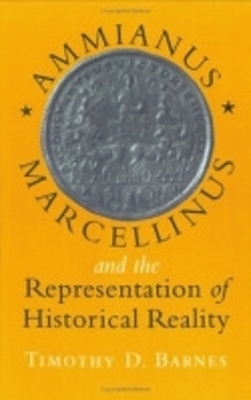
Ammianus Marcellinus and the Representation of Historical Reality
Seiten
1998
Cornell University Press (Verlag)
978-0-8014-3526-3 (ISBN)
Cornell University Press (Verlag)
978-0-8014-3526-3 (ISBN)
The Townsend Lectures
Much of what we know today of Rome in the fourth century has its source in Res Gestae, the sole surviving work of the historian Ammianus Marcellinus. The accuracy of Ammianus' reporting has come under question over the past fifty years, however, and Timothy D. Barnes here offers new grist for skepticism.
This is the first book on Ammianus to place equal emphasis on the literary and historical aspects of his writing. Barnes assesses Ammianus' depiction of historical reality by investigating the Res Gestae's strengths and weaknesses, as well as its literary qualities. He examines its structure and arrangement, emphasizes its Greek and pagan features, and points out the extent to which Ammianus drew on his imagination in shaping the narrative.
Ammianus, raised as a Christian, became an apostate when Julian seemed to promise a return to traditional religion and values. In Res Gestae, he expressed strongly held views, often in vivid and extreme language. Barnes explores the historian's biases and personal prejudices, documenting seemingly intentional distortions and demonstrating that Ammianus advanced a pessimistic and anti-Christian interpretation of the Roman Empire.
Much of what we know today of Rome in the fourth century has its source in Res Gestae, the sole surviving work of the historian Ammianus Marcellinus. The accuracy of Ammianus' reporting has come under question over the past fifty years, however, and Timothy D. Barnes here offers new grist for skepticism.
This is the first book on Ammianus to place equal emphasis on the literary and historical aspects of his writing. Barnes assesses Ammianus' depiction of historical reality by investigating the Res Gestae's strengths and weaknesses, as well as its literary qualities. He examines its structure and arrangement, emphasizes its Greek and pagan features, and points out the extent to which Ammianus drew on his imagination in shaping the narrative.
Ammianus, raised as a Christian, became an apostate when Julian seemed to promise a return to traditional religion and values. In Res Gestae, he expressed strongly held views, often in vivid and extreme language. Barnes explores the historian's biases and personal prejudices, documenting seemingly intentional distortions and demonstrating that Ammianus advanced a pessimistic and anti-Christian interpretation of the Roman Empire.
Timothy D. Barnes is Professor of Classics at the University of Toronto. Among his other books is Tertullian: A Historical and Literary Study.
| Erscheint lt. Verlag | 24.9.1998 |
|---|---|
| Reihe/Serie | Cornell Studies in Classical Philology |
| Verlagsort | Ithaca |
| Sprache | englisch |
| Maße | 155 x 235 mm |
| Gewicht | 907 g |
| Themenwelt | Geschichte ► Allgemeine Geschichte ► Vor- und Frühgeschichte |
| Geisteswissenschaften ► Geschichte ► Geschichtstheorie / Historik | |
| Geisteswissenschaften ► Geschichte ► Regional- / Ländergeschichte | |
| ISBN-10 | 0-8014-3526-9 / 0801435269 |
| ISBN-13 | 978-0-8014-3526-3 / 9780801435263 |
| Zustand | Neuware |
| Haben Sie eine Frage zum Produkt? |
Mehr entdecken
aus dem Bereich
aus dem Bereich
auf den Spuren der frühen Zivilisationen
Buch | Hardcover (2023)
C.H.Beck (Verlag)
20,00 €
Konzepte – Methoden – Theorien
Buch | Softcover (2024)
UTB (Verlag)
39,90 €
Was Pompeji über uns erzählt
Buch | Hardcover (2023)
Propyläen (Verlag)
32,00 €


